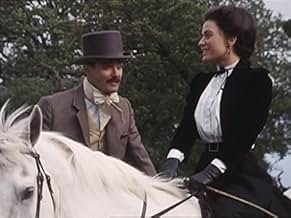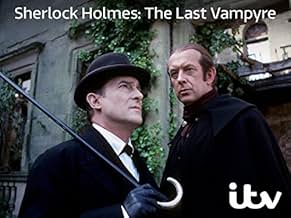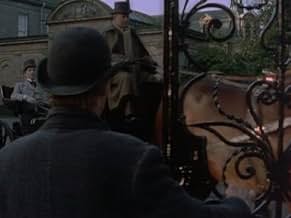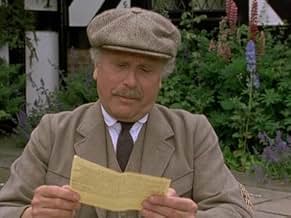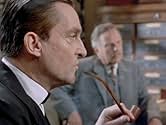The Case-Book of Sherlock Holmes
- Fernsehserie
- 1991–1993
- 50 Min.
IMDb-BEWERTUNG
8,7/10
6472
IHRE BEWERTUNG
Füge eine Handlung in deiner Sprache hinzuHolmes and Dr. Watson solve the mysteries of the Disappearance of Lady Frances Carfax, Thor Bridge, Shoscombe Old Place, The Boscombe Valley Mystery, The Illustrious Client and The Creeping ... Alles lesenHolmes and Dr. Watson solve the mysteries of the Disappearance of Lady Frances Carfax, Thor Bridge, Shoscombe Old Place, The Boscombe Valley Mystery, The Illustrious Client and The Creeping Man.Holmes and Dr. Watson solve the mysteries of the Disappearance of Lady Frances Carfax, Thor Bridge, Shoscombe Old Place, The Boscombe Valley Mystery, The Illustrious Client and The Creeping Man.
Folgen durchsuchen
Empfohlene Bewertungen
Thank goodness for the wonderful folks at Granada Television. In the mid 1980s, they created the absolute best Sherlock Holmes ever to make it to the big or small screen. Unlike all the previous versions, which LIBERALLY deviated from the Conan Doyle stories, the Granada films tried to be perfect in every detail.
Unlike the caricature of Holmes that you see in previous films where he wears a deerstalker hat, smokes a curved pipe and spouts "elementary, my dear Watson", this Holmes is true to the original character. Additionally, Dr. Watson is not the bumbling idiot as portrayed by Nigel Bruce (Bruce should burn in Hell for how he ruined this character).
The first mini-series by Granada was exceptional and Jeremy Brett was the greatest Holmes ever. The second picked up exactly where it should have as did this third series.
Intelligently written and wonderful throughout. See these films and get hooked!!
Unlike the caricature of Holmes that you see in previous films where he wears a deerstalker hat, smokes a curved pipe and spouts "elementary, my dear Watson", this Holmes is true to the original character. Additionally, Dr. Watson is not the bumbling idiot as portrayed by Nigel Bruce (Bruce should burn in Hell for how he ruined this character).
The first mini-series by Granada was exceptional and Jeremy Brett was the greatest Holmes ever. The second picked up exactly where it should have as did this third series.
Intelligently written and wonderful throughout. See these films and get hooked!!
The fascinating Granada series with the incredible Jeremy Brett as the master sleuth Sherlock Holmes continued well into the 1990's with episodes pertaining to the later life of the great detective. The stories, in read form, are quite fascinating and when brought to the screen, they were, as always carried over with care and panache.
Bendict Who? The consummate TV Sherlock Holmes (Jeremy Brett) returns with his loyal friend Doctor John H. Watson (Edward Hardwicke) in another series of fighting the foes of civilization.
Unfortunately, the ravages of time and illness have taken their toll on Brett. He looks bad (accentuated by the incessant close-ups). Somewhere in the middle of "The Return of Sherlock Holmes" Brett began sounding like he had a permanent head-cold. That's gotten a lot worse.
The big take-away from this series is "The Boscombe Valley Mystery." It's almost like the glory days of the first two series. "The Disappearance of Lady Carfax" with guest stars Cheryl Campbell and Michael Jayston is acceptable, despite the changes to the story, the exreme downer ending, and the fact that Holmes spends the first part of the story playing with toys. "Shoscombe Old Place" sticks closely to the story but the Charles Augustus Milverton-based "The Master Blackmailer" is only good for a welcome appearance of Colin Jeavon's Lestrade, which is as iconic as Brett's Holmes. "The Last Vampire" marks a nadir not only for this series but the entire Brett/Holmes era. The other episodes, while not so dreadful as "Vampire," are unremarkable.
Jeremy Brett's reign as Sherlock Holmes was welcome from the start and Holmes/Watson fans rejoiced. But Brett's unfortunately failing physical and mental facilities (a sad story worthy of a TV movie of the week) unfortunately wrecked our hopes. By the final series, Charles Gray's Mycroft was picking up too much slack.
Too, the stories were given too much licence and produced weird anomalies.
"The Adventures of Sherlock Holmes" with Brett still stands as the best Sherlock Holmes series I've ever seen and "The Return of Sherlock Holmes," despite the changed Watson, while only occasionally touching those initial Olympian heights, is quite good. By "The Casebook of Sherlock Holmes" the whole shebang was unraveling. What a shame.
The best few episodes still stand up as first-rate Holmes. The rest . . . Oh, the humanity!
Unfortunately, the ravages of time and illness have taken their toll on Brett. He looks bad (accentuated by the incessant close-ups). Somewhere in the middle of "The Return of Sherlock Holmes" Brett began sounding like he had a permanent head-cold. That's gotten a lot worse.
The big take-away from this series is "The Boscombe Valley Mystery." It's almost like the glory days of the first two series. "The Disappearance of Lady Carfax" with guest stars Cheryl Campbell and Michael Jayston is acceptable, despite the changes to the story, the exreme downer ending, and the fact that Holmes spends the first part of the story playing with toys. "Shoscombe Old Place" sticks closely to the story but the Charles Augustus Milverton-based "The Master Blackmailer" is only good for a welcome appearance of Colin Jeavon's Lestrade, which is as iconic as Brett's Holmes. "The Last Vampire" marks a nadir not only for this series but the entire Brett/Holmes era. The other episodes, while not so dreadful as "Vampire," are unremarkable.
Jeremy Brett's reign as Sherlock Holmes was welcome from the start and Holmes/Watson fans rejoiced. But Brett's unfortunately failing physical and mental facilities (a sad story worthy of a TV movie of the week) unfortunately wrecked our hopes. By the final series, Charles Gray's Mycroft was picking up too much slack.
Too, the stories were given too much licence and produced weird anomalies.
"The Adventures of Sherlock Holmes" with Brett still stands as the best Sherlock Holmes series I've ever seen and "The Return of Sherlock Holmes," despite the changed Watson, while only occasionally touching those initial Olympian heights, is quite good. By "The Casebook of Sherlock Holmes" the whole shebang was unraveling. What a shame.
The best few episodes still stand up as first-rate Holmes. The rest . . . Oh, the humanity!
These comments apply to all the Sherlock Holmes series and episodes produced by Granada and starring Jeremy Brett as Holmes and either Burke or Hardwicke as Watson.
Brett certainly gave the most definitive portrayal of Holmes. One must remember that Holmes, although a decent and upright gentleman had his dark side -- his conceit, impatience with people of lesser intelligence and, as a product of imperial Victorian England, he displayed traces of jingoism, racism, sexism and hypocrisy. Note that episode where he remarks on the French surname of a suspect or in the cavalier manner he uses pejoratives to refer to peoples of Asiatic origin. In another episode he tells Watson that his nemesis is "but a woman." Expecting high moral standards of others, he was nevertheless a drug addict (cocaine in the original stories by Doyle and also absinthe in the Granada series). He also used smoked opium occasionally when in disguise to track down suspects or missing persons. In one episode he was caught red-handed by Watson (the one portrayed by Hardwicke) with a syringe although it is not certain what drug it was supposed to contain, probably morphine as I doubt if heroin had already been extracted from opium at that time.
These flaws viewed in the context of the era and of the peculiar circumstances of Holmes, instead of making him out as an ogre, make him all the more human and believable. On the whole, however, Brett's Holmes is exceedingly kind, self sacrificing and high minded. He could also be quite droll and able to take jokes at his expense as when a phrenologist remarked that he would very much like to take a cast of the cranium of the very intelligent Holmes "until the original should become available." Note that he rarely collects fees and places life and limb on the line for his clients. No wonder the sophisticatedly discerning French have a Jeremy Brett society.
Between Burke and Hardwicke as Watson, one is likely to vote for Burke as he is funnier, younger and better looking. But Hardwicke better displays the character of a retired officer of the Indian (Imperial British) Army by his physical courage and readiness to use his firearm. His portrayal also brings out the difficult side of Holmes. It was to Hardwicke's Watson that Holmes unusually expresses (in a letter in Hound of the Baskervilles) deep concern and affection with such words as "there is nothing that I desire more than to have you safely back in our Baker st. lodgings." Finally, if you have seen all the episodes, watch them again and keep your eyes peeled for those delicious antiques -- porcelain washbowls, iron stoves, 19th century lamps, brass door knockers, handsome hansoms and carriages, even a pristine horse drawn red and brass fire engine with immaculate white hoses. And were those mansions, manor houses and country cottages merely sets or genuine locations? I suspect the latter. I would suggest to the English that they revise their Sherlock Holmes tours to include visits to places where Granada shot the series.
Brett certainly gave the most definitive portrayal of Holmes. One must remember that Holmes, although a decent and upright gentleman had his dark side -- his conceit, impatience with people of lesser intelligence and, as a product of imperial Victorian England, he displayed traces of jingoism, racism, sexism and hypocrisy. Note that episode where he remarks on the French surname of a suspect or in the cavalier manner he uses pejoratives to refer to peoples of Asiatic origin. In another episode he tells Watson that his nemesis is "but a woman." Expecting high moral standards of others, he was nevertheless a drug addict (cocaine in the original stories by Doyle and also absinthe in the Granada series). He also used smoked opium occasionally when in disguise to track down suspects or missing persons. In one episode he was caught red-handed by Watson (the one portrayed by Hardwicke) with a syringe although it is not certain what drug it was supposed to contain, probably morphine as I doubt if heroin had already been extracted from opium at that time.
These flaws viewed in the context of the era and of the peculiar circumstances of Holmes, instead of making him out as an ogre, make him all the more human and believable. On the whole, however, Brett's Holmes is exceedingly kind, self sacrificing and high minded. He could also be quite droll and able to take jokes at his expense as when a phrenologist remarked that he would very much like to take a cast of the cranium of the very intelligent Holmes "until the original should become available." Note that he rarely collects fees and places life and limb on the line for his clients. No wonder the sophisticatedly discerning French have a Jeremy Brett society.
Between Burke and Hardwicke as Watson, one is likely to vote for Burke as he is funnier, younger and better looking. But Hardwicke better displays the character of a retired officer of the Indian (Imperial British) Army by his physical courage and readiness to use his firearm. His portrayal also brings out the difficult side of Holmes. It was to Hardwicke's Watson that Holmes unusually expresses (in a letter in Hound of the Baskervilles) deep concern and affection with such words as "there is nothing that I desire more than to have you safely back in our Baker st. lodgings." Finally, if you have seen all the episodes, watch them again and keep your eyes peeled for those delicious antiques -- porcelain washbowls, iron stoves, 19th century lamps, brass door knockers, handsome hansoms and carriages, even a pristine horse drawn red and brass fire engine with immaculate white hoses. And were those mansions, manor houses and country cottages merely sets or genuine locations? I suspect the latter. I would suggest to the English that they revise their Sherlock Holmes tours to include visits to places where Granada shot the series.
Jeremy Brett is ( possibly next to William Gillette, Basil Rathbone or Arthur Wontner ) the greatest Holmes portrayer of all time. He, with Edward Hardwicke (son of Sir Cedric) make the stories come alive with actors just like the characters. If you love Holmes, try to catch this on TV (I'll admit it's not always on).
Wusstest du schon
- WissenswertesThe last performance of Dame Gwen Ffrangcon Davies. NOTE: She was 100. She gave up the stage in her 80s when her eyesight made moving around the sets unsafe. In several of her few film roles she appears seated.
- VerbindungenEdited into Biography: Sherlock Holmes: The Great Detective (1995)
Top-Auswahl
Melde dich zum Bewerten an und greife auf die Watchlist für personalisierte Empfehlungen zu.
- How many seasons does The Case-Book of Sherlock Holmes have?Powered by Alexa
Details
Zu dieser Seite beitragen
Bearbeitung vorschlagen oder fehlenden Inhalt hinzufügen

Oberste Lücke
What is the French language plot outline for The Case-Book of Sherlock Holmes (1991)?
Antwort
